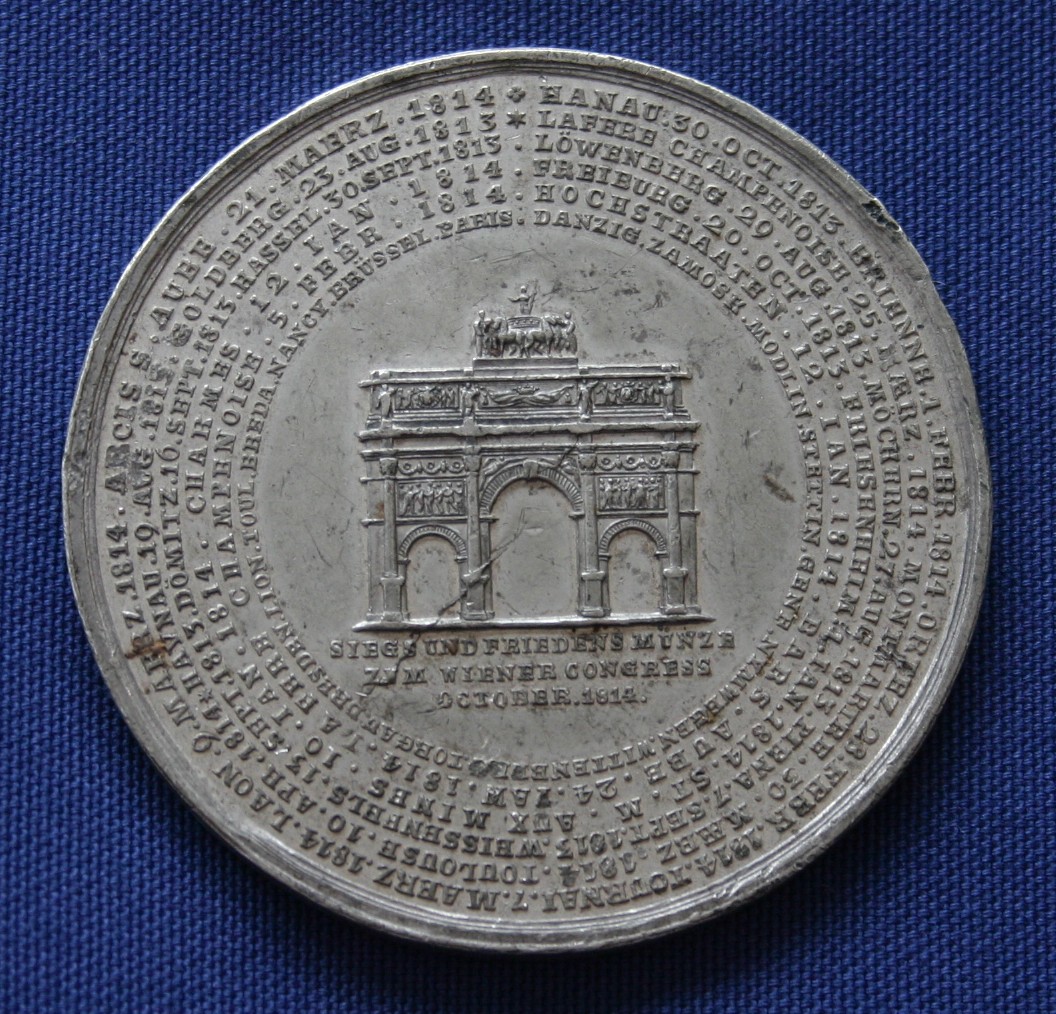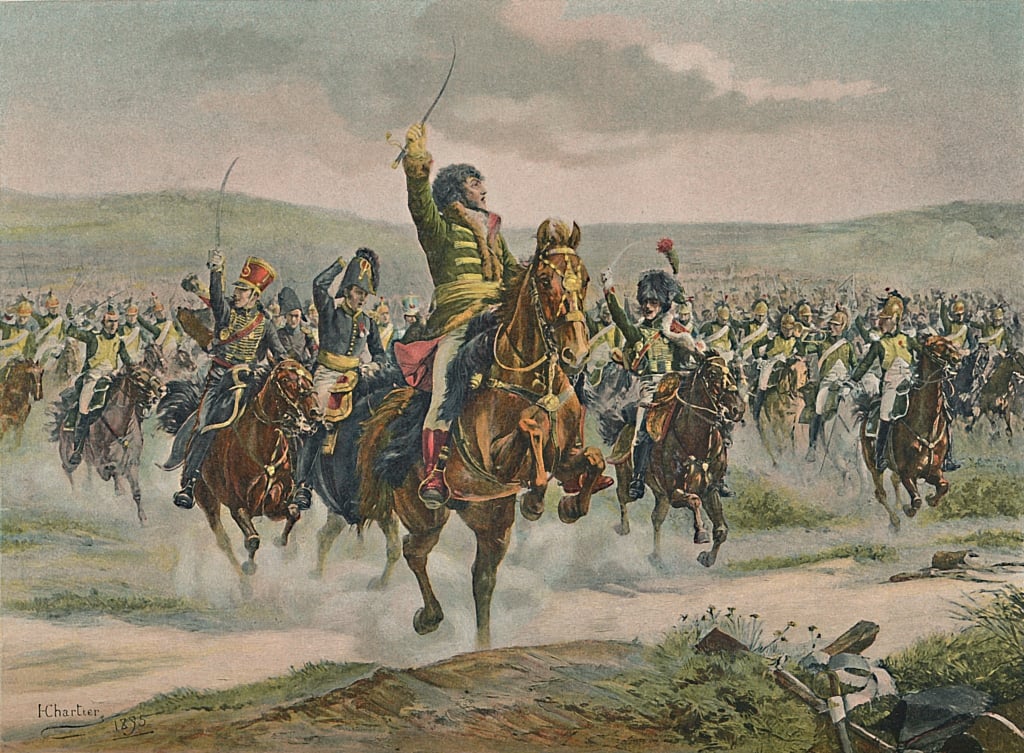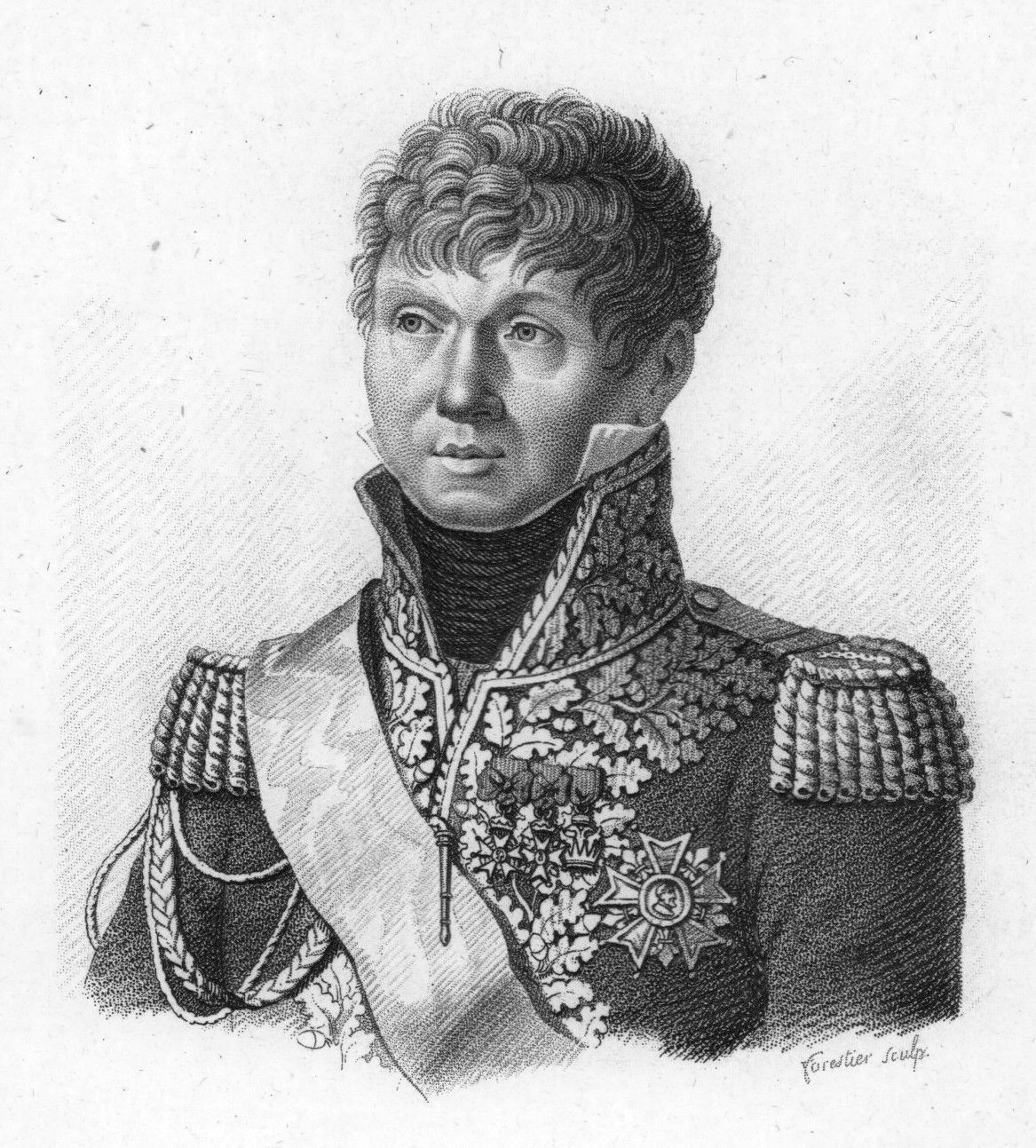|
Battle Of Leipzig
The Battle of Leipzig (french: Bataille de Leipsick; german: Völkerschlacht bei Leipzig, ); sv, Slaget vid Leipzig), also known as the Battle of the Nations (french: Bataille des Nations; russian: Битва народов, translit=Bitva narodov), was fought from 16 to 19 October 1813 at Leipzig, Saxony. The Coalition armies of Austria, Prussia, Sweden, and Russia, led by Tsar Alexander I and Karl von Schwarzenberg, decisively defeated the '' Grande Armée'' of French Emperor Napoleon Bonaparte. Napoleon's army also contained Polish and Italian troops, as well as Germans from the Confederation of the Rhine (mainly Saxony and Württemberg). The battle was the culmination of the German Campaign of 1813 and involved 560,000 soldiers, 2,200 artillery pieces, the expenditure of 400,000 rounds of artillery ammunition, and 133,000 casualties, making it the largest battle in Europe prior to World War I. Decisively defeated again, Napoleon was compelled to return to Franc ... [...More Info...] [...Related Items...] OR: [Wikipedia] [Google] [Baidu] |
German Campaign Of 1813
The German campaign (german: Befreiungskriege , lit=Wars of Liberation ) was fought in 1813. Members of the Sixth Coalition, including the German states of Austria and Prussia, plus Russia and Sweden, fought a series of battles in Germany against the French Emperor Napoleon, his marshals, and the armies of the Confederation of the Rhine - an alliance of most of the other German states - which ended the domination of the First French Empire. After the devastating defeat of Napoleon's ''Grande Armée'' in the Russian campaign of 1812, Johann Yorck – the general in command of the ''Grande Armée'''s German auxiliaries (') – declared a ceasefire with the Russians on 30 December 1812 via the Convention of Tauroggen. This was the decisive factor in the outbreak of the German campaign the following year. The spring campaign between France and the Sixth Coalition ended inconclusively with a summer truce ( Truce of Pläswitz). Via the Trachenberg Plan, developed during a peri ... [...More Info...] [...Related Items...] OR: [Wikipedia] [Google] [Baidu] |
Gebhard Leberecht Von Blücher
Gebhard Leberecht von Blücher, Fürst von Wahlstatt (; 21 December 1742 – 12 September 1819), ''Graf'' (count), later elevated to ''Fürst'' (sovereign prince) von Wahlstatt, was a Prussian '' Generalfeldmarschall'' (field marshal). He earned his greatest recognition after leading his army against Napoleon I at the Battle of the Nations at Leipzig in 1813 and the Battle of Waterloo in 1815. Blücher was born in Rostock, the son of a retired army captain. His military career began in 1758 as a hussar in the Swedish Army. He was captured by the Prussians in 1760 during the Pomeranian Campaign and thereafter joined the Prussian Army, serving as a hussar officer for Prussia during the remainder of the Seven Years' War. In 1773, Blücher was forced to resign by Frederick the Great for insubordination. He worked as a farmer until the death of Frederick in 1786, when Blücher was reinstated and promoted to colonel. For his success in the French Revolutionary Wars, Blücher became ... [...More Info...] [...Related Items...] OR: [Wikipedia] [Google] [Baidu] |
Joachim Murat
Joachim Murat ( , also , ; it, Gioacchino Murati; 25 March 1767 – 13 October 1815) was a French military commander and statesman who served during the French Revolutionary Wars and Napoleonic Wars. Under the French Empire he received the military titles of Marshal of the Empire and Admiral of France. He was the 1st Prince Murat, Grand Duke of Berg from 1806 to 1808 and King of Naples as Joachim-Napoleon ( it, Gioacchino Napoleone, links=no) from 1808 to 1815. He was the brother-in-law of Napoleon Bonaparte. Early life Murat was born on 25 March 1767 in La Bastide-Fortunière (later renamed Labastide-Murat after him), in Guyenne (the present-day French department of Lot). His father was Pierre Murat-Jordy (d. 27 July 1799), an affluent yeoman, innkeeper, postmaster and Roman Catholic churchwarden. His mother was Jeanne Loubières (1722 – 11 March 1806), the daughter of Pierre Loubières and his wife Jeanne Viellescazes. Murat's father, Pierre Murat-Jordy, was t ... [...More Info...] [...Related Items...] OR: [Wikipedia] [Google] [Baidu] |
Józef Poniatowski
Prince Józef Antoni Poniatowski (; 7 May 1763 – 19 October 1813) was a Polish general, minister of war and army chief, who became a Marshal of the French Empire during the Napoleonic Wars. A nephew of king Stanislaus Augustus of Poland (), Poniatowski began his military career in 1780 in the Austrian army, where he attained the rank of colonel. In 1789, after leaving Austrian service, he joined the Polish army at the request of his uncle. Poniatowski, now in the rank of major general and commander of the Royal Guards, took part in the Polish–Russian War of 1792, leading the crown forces at the victorious Battle of Zieleńce. After the king's support for the Targowica Confederation of 1792, Poniatowski felt compelled to resign. In 1794 he participated in the Kościuszko Uprising and took charge of defending Warsaw - for which the Russian authorities subsequently exiled him until 1798. In 1807, after Napoleon Bonaparte established the Duchy of Warsaw, Józef Poniatowski was ... [...More Info...] [...Related Items...] OR: [Wikipedia] [Google] [Baidu] |
Jacques Lauriston
Jacques Alexandre Bernard Law, marquis de Lauriston (1 February 1768 – 12 June 1828) was a French soldier and diplomat of Scottish descent, and a general officer in the French Army during the Napoleonic Wars. He was born in Pondicherry in French India, where his father, Jean Law de Lauriston, was Governor-General. Jean Law de Lauriston was a nephew of the financier John Law. Jacques’ mother was a member of the Carvallho family of Portuguese traders. Lauriston Castle, in Scotland, was inherited by John Law in 1729. Lauriston is one of the names inscribed under the Arc de Triomphe. Early career Lauriston obtained his first commission about 1786, served with the artillery and on the general staff during the early campaigns of the Revolution, and became brigadier of artillery in 1795. Resigning in 1796, he was brought back into the service in 1800 as '' aide-de-camp'' to Napoleon, with whom, as a cadet, Lauriston had been on friendly terms. In the years immediately preceding t ... [...More Info...] [...Related Items...] OR: [Wikipedia] [Google] [Baidu] |
Claude Victor-Perrin
Claude-Victor Perrin, 1st Duke of Belluno (7 December 1764 – 1 March 1841) was a French soldier and military commander who served during both the French Revolutionary Wars and the Napoleonic Wars. He was made a Marshal of the Empire in 1807 by Emperor Napoleon I. Life He was born at Lamarche in the Vosges in 1764, son of Charles Perrin and wife Marie Anne Floriot, paternal grandson of Charles Perrin and wife Gabrielle Guerin, born in 1696, and great-grandson of Pierre Perrin and wife Anne Louvière. At the age of 17 he enlisted in the artillery regiment in Grenoble as a private soldier, and after ten years' service he applied for and received his discharge because of his disgust at the manners revolutionary army and settled at Valence. Soon afterwards he joined the local volunteers, and distinguishing himself in the war on the Alpine frontier, in less than a year he had risen to the command of a battalion. In Drôme, Valence, on 16 May 1791 he married Jeanne Josephin ... [...More Info...] [...Related Items...] OR: [Wikipedia] [Google] [Baidu] |
Nicolas Oudinot
Nicolas Charles Oudinot, 1st Count Oudinot, 1st Duke of Reggio (25 April 1767 in Bar-le-Duc – 13 September 1847 in Paris), was a Marshal of the Empire. He is known to have been wounded 34 times in battle, being hit by artillery shells, sabers, and at least twelve bullets over the course of his military career. Oudinot is one of the Names inscribed under the Arc de Triomphe, Eastern pillar Columns 13, 14. Early life Nicolas Charles Oudinot was the son of Nicolas Oudinot and Marie Anne Adam, the only one of their nine children to live to adulthood. His father was a brewer, farmer and distiller of brandy in Bar-le-Duc, Lorraine. He decided upon a military career, and served in the regiment of Medoc from 1784 to 1787, when, having no hope of promotion on account of his non-noble birth, he retired with the rank of sergeant. French Revolutionary Wars The French Revolution changed his fortunes, and in 1792, on the outbreak of war, he was elected lieutenant-colonel of the 3rd ... [...More Info...] [...Related Items...] OR: [Wikipedia] [Google] [Baidu] |
Michel Ney
Michel Ney, 1st Duke of Elchingen, 1st Prince of the Moskva (; 10 January 1769 – 7 December 1815), was a French military commander and Marshal of the Empire who fought in the French Revolutionary Wars and the Napoleonic Wars. He was one of the original 18 Marshals of the Empire created by Napoleon I. He was known as Le Rougeaud by his men; Napoleon characterized him as "le Brave des braves (the Bravest of the Brave), a real paladin in the field, a braggart without judgment and decision in the workroom and after all is said, a Don Quixote." Early life Ney was born in the town of Sarrelouis, in the French province of the Three Bishoprics, along the French–German border. He was the second son of Pierre Ney (1738–1826), a master cooper and veteran of the Seven Years' War, and his wife Marguerite Greiveldinger. He was the paternal grandson of Matthias Ney (1700–1780) and wife Margarethe Becker (d. 1767), and the maternal grandson of Valentin and wife Margaretha Ding ... [...More Info...] [...Related Items...] OR: [Wikipedia] [Google] [Baidu] |
Édouard Mortier
Édouard is both a French given name and a surname, equivalent to Edward in English. Notable people with the name include: * Édouard Balladur (born 1929), French politician * Édouard Boubat (1923–1999), French photographer * Édouard Colonne (1838–1910), French conductor * Édouard Daladier (1884–1970), French prime minister at the start of World War II * Edouard Drumont (1844–1917), French anti-semitic journalist * Édouard Dujardin (1861–1949), French writer * Édouard Gagnon (1918–2007), French Canadian cardinal * Édouard Herriot (1872–1957), French prime minister, three times, and mayor of Lyon from 1905 to 1957 * Edouard F. Henriques, Make-up artist * Édouard Lalo (1823–1892), French composer * Édouard Lockroy (1838–1913), French politician * Édouard Louis (born 1992), French Writer * Édouard Lucas (1842–1891), French mathematician * Édouard Mathé (1886–1934), French silent film actor * Édouard Manet (1832–1883), French impressionist pai ... [...More Info...] [...Related Items...] OR: [Wikipedia] [Google] [Baidu] |
Auguste De Marmont
Auguste Frédéric Louis Viesse de Marmont (20 July 1774 – 22 March 1852) was a French general and nobleman who rose to the rank of Marshal of the Empire and was awarded the title (french: duc de Raguse). In the Peninsular War Marmont succeeded the disgraced André Masséna in the command of the French army in northern Spain, but lost decisively at the Battle of Salamanca. At the close of the War of the Sixth Coalition, Marmont went over to the Restoration, and remained loyal to the Bourbons through the Hundred Days. This gave Marmont a reputation as a traitor among the remaining Bonapartists, and in French society more broadly. He led the royalist Paris garrison during the July Revolution in 1830, but his efforts proved incapable of quelling the revolution, leading King Charles X to accuse Marmont of betraying the Bourbons as he had betrayed the Bonapartes. Marmont departed France with Charles's entourage and never returned to France. Spending his exile mostly in Vienna a ... [...More Info...] [...Related Items...] OR: [Wikipedia] [Google] [Baidu] |
Jacques MacDonald
Ancient and noble French family names, Jacques, Jacq, or James are believed to originate from the Middle Ages in the historic northwest Brittany region in France, and have since spread around the world over the centuries. To date, there are over one hundred identified noble families related to the surname by the Nobility & Gentry of Great Britain & Ireland. Origins The origin of this surname ultimately originates from the Latin, Jacobus which belongs to an unknown progenitor. Jacobus comes from the Hebrew name, Yaakov, which translates as "one who follows" or "to follow after". Ancient history A French knight returning from the Crusades in the Holy Lands probably adopted the surname from "Saint Jacques" (or "James the Greater"). James the Greater was one of Jesus' Twelve Apostles, and is believed to be the first martyred apostle. Being endowed with this surname was an honor at the time and it is likely that the Church allowed it because of acts during the Crusades. Indeed, ... [...More Info...] [...Related Items...] OR: [Wikipedia] [Google] [Baidu] |
Louis-Alexandre Berthier
Louis-Alexandre Berthier (20 November 1753 – 1 June 1815), Prince of Neuchâtel and Valangin, Prince of Wagram, was a French Marshal of the Empire who served during the French Revolutionary Wars and the Napoleonic Wars. He was twice Minister of War of France and served as chief of staff to Napoleon Bonaparte. Born into a military family, Berthier served in the French Army and survived suspicion of monarchism during the Reign of Terror before a rapid rise in the ranks of the French Revolutionary Army. Although a key supporter of the coup against the Directory that gave Napoleon supreme power, and present for his greatest victories, Berthier strongly opposed the progressive stretching of lines of communication during the Russian campaign. Allowed to retire by the restored Bourbon regime, he died of unnatural causes shortly before the Battle of Waterloo. Berthier's reputation as a superb operational organiser remains strong among current historians. Early life Berthier was ... [...More Info...] [...Related Items...] OR: [Wikipedia] [Google] [Baidu] |


.jpg)



.jpg)


